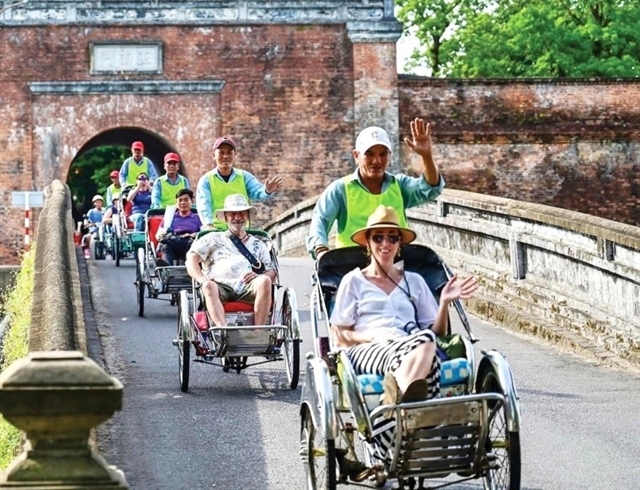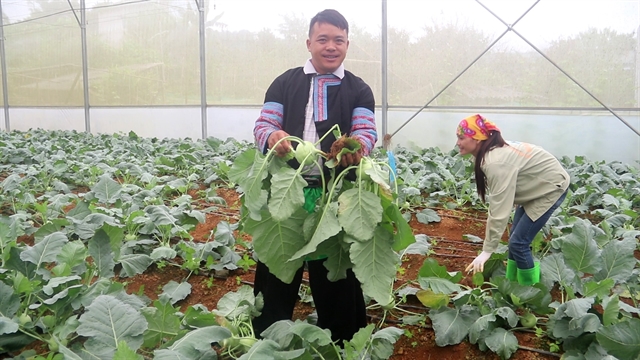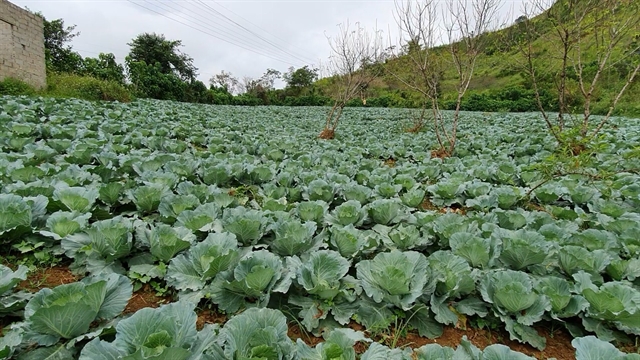 Society
Society

Lives in a small poor remote village of Vân Hồ District, northern mountainous Sơn La Province are showing signs of improvement after farmers switched their long-standing cultivating habits.
Ly Ly Cao
SƠN LA — Lives in a small poor remote village of Vân Hồ District, northern mountainous Sơn La Province are showing signs of improvement after farmers switched their long-standing cultivating habits.
And despite some early teething problems, today it’s not only the vegetables, but also their salaries that are growing strong.

|
| Vàng A Sa in his kohlrabi growing house in Bó Nhàng 2 village, Vân Hồ District, Sơn La Province. — VNS Photos Ly Ly Cao |
Vàng A Sa is the leader of an agricultural cooperative of Bó Nhàng 2 village. Each day he will load the cabbages, kohrabi and tomatoes onto a small truck. Within hours they are on the shelves at Big C supermarkets and often purchased by customers that very same day.
From farm to table in no time at all.
His cooperative provides around VNĐ300 million of produce each month which has helped the revenue of his members triple.
“I am a representative of my cooperative to work with other leaders here to sell our products, so my income is around US$1,300-1,500 a month,” Vàng A Sa said.
Before this, the village was poor and people had very low standards of living.
A few years ago, Vàng A Sa started up his business with traditional vegetables on around 1,000 square metres of land, but didn’t break even. Because his business was small, the capacity was low since he didn’t have enough cultivation techniques.
Local market prices were also not consistent.
In 2015, a project called ACIAR – sponsored by the Australian Government – was implemented to support farmers growing vegetables in Vân Hồ and Mộc Châu and teach them cultivation techniques. Only then did they learn how to maximise their capacities and work together to create farming cooperatives.
“The first project that we joined was ACIAR which was sponsored by the Australian Government to help us in cultivating ground and harvesting,” Vàng A Sa added.
“Then officials from the Center of Agriculture of Vân Hồ District directly supported us with training in planting techniques, using pesticides and harvest cycles to get the best result.”

|
| Cabbages in Bó Nhàng 2 village, Vân Hồ District, Sơn La Province. |
Changing traditional cultivation practices wasn’t an easy task at first, but Vàng A Sa knew it was for the best.
“At first I was not familiar with the VietGap process which is a safe agricultural production process in Việt Nam,” Vàng A Sa said.
“Because for each step in the process, we need to record and comply with pesticide standards. It was difficult at that time, but we were trained.
“Some of the first crops were difficult, then we got used to it and now, farmers all feel comfortable with the process.”
This project only provides planting techniques.
Vàng A Sa and his community still struggled with finding markets for their products until 2018 when he joined the community livelihood project of Central Retail Group.
The project helps Vàng A Sa and farmers there find suitable products and markets for the crops.
Nguyễn Thị Phương, Vice Director of Central Retail Group which owns Big C Supermarket system, said: “We started the livelihood project in Vân Hồ District in 2017, and we told members of the agricultural cooperative here to grow off-season products.
“With off-season products, farmers can benefit from value because these products’ prices are three to four times higher than products from main crops.”
This project has been deployed in seven places, spreading from North to Central Việt Nam, mostly in poor, remote areas. Depending on the areas, appropriate products will be chosen for development.
With the success of the project in Vân Hồ District, the local authority hopes there will be more projects like this to help not only poor people, but also turn Sơn La Province into a raw material supplier of clean vegetables.
“I think this is a very sustainable chain to help people in remote areas, especially poor remote areas to improve their standards of living,” Vũ Đức Thuận, Director of the Department of Planning and Investment of Sơn La Province, said.
“We hope Big C and other companies will help Sơn La expand this production method.
“This will help Sơn La eliminate hunger and reduce poverty, and also develop our province into a raw material supplier to supply clean vegetables, fruits to Hà Nội market.” — VNS




